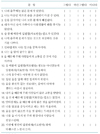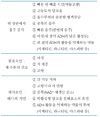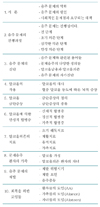Abstract
A brief advice by a physician to problem drinkers are known to be very effective in reducing alcohol consumption, health care utilization, motor vehicle events, and its related costs. This article is to provide the definition of moderate drinking and screening methods for alcohol problems in the context of primary care. Various individualized strategies of education can be applied to the patients based on their drinking habits on each visit. Regular programs of group education for problem drinkers and their families are also considered to be useful methods in both ambulatory and hospital settings. From preventive perspectives, public health educations should be focused on the establishment of a culture of moderate drinking in the community.
Figures and Tables
References
3. Fleming MF, Barry KL, Manwell LB, Johnson K, London R. Brief physician advice for problem drinkers: a randomized controlled trial in community-based primary care practices. JAMA. 1997. 277:1039–1045.

4. Fleming MF, Mundt MP, French MT, Manwell LB, Stauffacher EA, Barry KL. Brief physician advice for problem drinkers: long-term efficacy and benefit-cost analysis. Alcohol Clin Exp Res. 2002. 26:36–43.

5. US Department of Agriculture. Dietary guidelines for Americans. 2000. USDA;18.
6. Cobbs EL, Duthie EH, Murphy JB. Geriatric review syllabus : A core curriculum in geriatric medicine. 2002. 5th ed. MA: Blackwell Publishing Co;243–249.
7. Saunders JB, Aasland OG, Amundsen A, Grant M. Alcohol consumption and related problems among primary health care patients: WHO Collaborative Project on Early Detection of Persons with Harmful Alcohol Consumption I. Addiction. 1993. 88:349–362.

8. Saunders JB, Aasland OG, Babor TF, de la Fuente JR, Grant M. Development of the Alcohol Use Disorders Identification Test (AUDIT): WHO Collaborative Project on Early Detection of Persons with Harmful Alcohol Consumption II. Addiction. 1993. 88:791–804.

10. Wannamethee G, Whincup PH, Shaper AG, Walker M, Mac-Farlane PW. Factors determining case fatality in myocardial infarction "Who dies in a heart attack?". Br heart J. 1995. 74:324–331.





 PDF
PDF ePub
ePub Citation
Citation Print
Print















 XML Download
XML Download